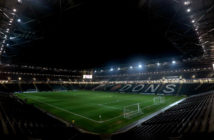Despite being tipped as one of the favourites to win the UEFA European Under-21 Championship, England were stunned by a plucky Switzerland side in the opening game of the group stages.
The Young Lions had been highlighted as one of the strongest sides in the competition along with France, Spain and Germany.
Both Callum Hudson-Odoi and Emile Smith-Rowe have featured regularly for Chelsea and Arsenal respectively in the last few months, while the likes of Ben Godfrey, Dwight McNeil and Eberechi Eze have also shone in the Premier League this season.
Being drawn in Group D alongside Switzerland, Croatia and Portugal created a tough but achievable path to the quarter-final for Aidy Boothroyd’s men, who lined up in his favoured 3-4-3 formation in their opening game at the Bonifika Stadium in Kopke, Slovenia.
While England dominated possession and had their fair share of chances, they never seemed to be a real threat to the Swiss side.
Mauro Lustrinelli’s men had more clear-cut opportunities at goal and could’ve easily been 2-0 up when the half-time whistle was blown. Brighton’s Andi Zeqiri had possibly the best chance of the opening 45 minutes, seeing his close-range shot saved by Aaron Ramsdale.
There was hope that the Young Lions would come out looking reinvigorated after the break, but ultimately it was much of the same. Eventually, with just under 15 minutes to play, OGC Nice’s Dan Ndoye saw his shot deflected and loop over Ramsdale which was a sucker punch that they were unable to recover from as they slumped to a 1-0 defeat.
Overall, the resounding feeling from England supporters has been frustration. Perhaps not at the defeat itself, but the manner in which it came.
Of course, Switzerland were not a team to be underestimated. They won all but one of their games in their qualification group, finishing second to tournament favourites France on goal difference alone. This young England side is so incredibly talented that it seems a waste to restrict their creativity and attacking strength.
After all, Boothroyd’s side breezed through the qualification stages, winning nine and drawing one of their ten matches in the group. The defeat to Switzerland is a perfect example of why the former Northampton manager is holding the England Under 21s back from achieving international success.
The 50-year-old’s 3-4-3 formation is incredibly organised. It involves playing the ball out from the back, while also setting up with men behind the ball when out of possession.
To accommodate this system, multiple players are played out of the normal positions that they feature in for their clubs. Perhaps the biggest example of this would be the wing-backs, Max Aarons and Dwight McNeil.
In order to fulfil this job, the wing-backs have to create the vast majority of width in the side, while also playing a defensive role when not on the ball.
Aarons is a natural full-back but has the energy and dynamism to play alongside three centre-backs. However, he doesn’t have the presence to control the right flank by himself. McNeil, on the other hand, is clearly not a wing-back and doesn’t suit playing behind Smith-Rowe on the left side of the pitch.
Oliver Skipp is another example of a superb player who doesn’t suit the 3-4-3 formation. The 20-year-old fits into Norwich’s 4-2-3-1 perfectly, where he’s deployed as one of two defensive midfielders behind a more creative outlet in front of him.
In Boothroyd’s system, there’s no creative midfielder to ease the attacking pressure on him when England push forward, often forcing him into uncomfortable positions high up the pitch.
Perhaps the biggest issue, however, is an over-reliance on certain players within the squad.
Arsenal’s Eddie Nketiah scored 13 goals in the Young Lions’ ten qualifying games but has been without regular football at club level for some time now. He captained the side in their defeat to Switzerland, in which he remained largely anonymous and struggled to carve out any clear chances.
Usually, Mason Greenwood would provide another attacking option, but the 19-year-old forward will miss the entirety of the group stages through injury.
On the other hand, Callum Hudson-Odoi has been a regular in Thomas Tuchel’s Chelsea side, but adapting to playing with the U21s is a big drop in quality.
He remains one of the star players in the side, meaning that a lot of what England do goes through him. He’s arguably the most skillful player in the competition, but his end product isn’t good enough to justify the immense attacking pressure on his shoulders.
That may be the best way to summarise the Young Lions’ current predicament. A lot of quality and a lot of skill, but ultimately not enough creativity and not enough going forward to threaten their opponents.
England’s respective U17 and U20 World Cup wins in 2017 means that there are high expectations for success in this competition, and failure to achieve it will ultimately see the finger pointed at Boothroyd.
He has to abandon his stubbornness and change the system to accommodate the incredibly talented players that are at his disposal if he is to keep his job and guide his side deep into the tournament.
The Young Lions face a tough test in their next game against Portugal on Sunday evening, where anything but a win would probably see them eliminated from the group stages of the competition.
Rui Jorge’s side will likely feature regulars from top European clubs, including AC Milan duo Diogo Dalot and Rafael Leão, as well as FC Barcelona’s Francisco Trincão.
Follow us on Twitter @ProstInt
![Prost International [PINT]](https://prostinternational.com/wp-content/uploads/2021/08/PINTtFontLogoRoboto1536x78.jpg)


